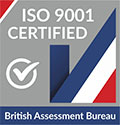Written by Remote Medical International (RMI) COO, Paul Budak.
On March 11, 2020, the World Health Organization officially declared COVID-19 a global pandemic. The virus threw most of the world’s population into a different way of life that they had to adapt to quickly.
Companies in our industry had to decide who, if anyone, could be in the office or on-site, how to screen and test employees, and how to establish new policies and procedures to ensure the safety and health of their teams.
Here at RMI, technology played a crucial role in our ability to respond to the pandemic swiftly. We met new demands brought on by COVID-19 by using technology, especially in screening and testing services. For better or worse, COVID-19 had a considerable effect on the technology sector.
COVID-19 Screening Services
It quickly became evident that COVID-19 screening needed to be the first step, and a COVID-19 screening app for employers was the way forward. This app needed to allow employees to self-screen or provide on-site screeners with the most effective and efficient screening tool.
To achieve this, we employed a mobile COVID-19 screening application giving employers access to screening and real-time data to keep their employees safe and maintain a steady workflow.
COVID-19 Testing Services
Testing for COVID-19 involves a lot of different processes, but the workflow generally follows this sequence:
- Employees sign consent and acknowledgment forms that protect them, their employers, and the medical professionals performing the testing and authorize sharing information.
- Employees receive the test, and medical professionals collect their specimens.
- Specimens get transferred to testing laboratories.
- Test results get obtained from the laboratory.
- Results get delivered to the employees that were tested, and their employer.
Without technology to back up this workflow, it would be impossible to manage all of this, and paper forms were not feasible. Especially given the volume of test participants, there would be almost no way to maintain the proper protection of health information and receive accurate and timely results.
That’s why RMI initiated a web-based process that allows the forms to be sent to individuals using a secure, HIPAA-compliant workflow.
All of the completed forms are in a safe, HIPAA-compliant location in the cloud; the system recovers the individuals’ results associated with the forms, forwards the results using a protected link, and keeps track of a company’s results.
Challenges
Workplace health and safety companies that were able to take their technology and quickly adapt it to the needed COVID-19 response benefited from the instant demand created by COVID-19 screening and testing. Challenges, however, were also generated.
With widespread sharing of test results with employers, a party generally not privy to PHI before COVID-19, one major challenge was managing Protected Health Information (PHI) and ensuring compliance with HIPAA regulations.
Companies that already knew how to comply with HIPAA were better prepared than other companies with no prior experience protecting health information.
RMI responded by identifying and developing secure technologies that the company could leverage for a more efficient yet PHI-protected solution to the COVID-19 challenges.
Future
One of the new realities COVID-19 exposed was the risk involved in simply traveling, whether across town or the country or even to the doctor’s office. People were only able to seek in-person medical care for just the most serious conditions. Global, federal, and state health authorities called for a temporary pause of routine checkups and elective procedures.
The postponement of in-person medical care gave rise to the acceleration of Telemedicine. Telemedicine was able to connect patients to providers safely and remotely. It’s not a surprise that we see increasing demand for Telemedicine services which we expect to continue after the pandemic.
Looking to the future, we know we are on the right track with technology. RMI was among the first companies to offer COVID-19 screening, testing, and consulting services in remote locations. We will continue to lead our market through the use of technology as we increase our capability to protect the lives of our customers’ workers.
Technology Will Continue to Play a Significant Role
Many companies in the technology industry already know how to adapt to client requirements and more extensive market changes.
They can support companies with application development like web-based or mobile phone applications and implement agile development methodologies to quickly create solutions to common challenges.
The trick is to ensure that new applications receive security, compliance, durability, and reliability testing.
As we navigate through this pandemic and beyond, technology will continue to play a significant role in delivering solutions for vaccinations, post-vaccination antibody testing, and our society’s response to future pandemics.
Paul Budak
Chief Operating Officer




